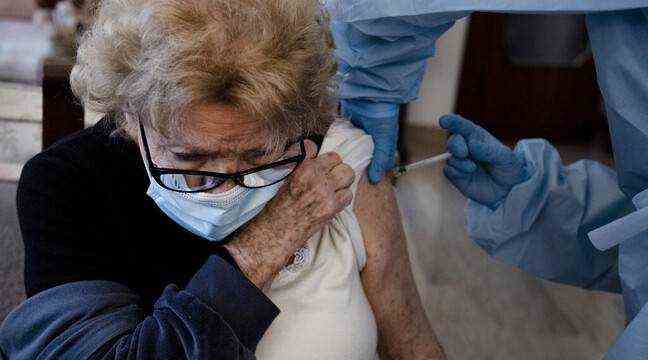Only 76% of those over 75 have received at least one dose of vaccine – Tiziana FABI / AFP
- While vaccination has been open to them since January 18, a quarter of those over 75 have still not received a dose of the Covid-19 vaccine.
- A statistic with heavy consequences: this population represents the overwhelming majority of deaths, and a large part of hospitalizations.
- How to remedy this and achieve vaccination of this population?
This Wednesday, May 12, it is possible in France to be vaccinated against Covid-19 regardless of your age (provided you are over 18 years old), if a slot has not found a taker within 24 hours of come. Paradoxically, while vaccination is opening up to an increasingly large audience, 24% of those over 75 have still not received the slightest dose.
However, they have been eligible since January 18, almost four months. They also represented 77% of deaths between March 1 and April 27, 2021, and 44% of hospitalizations. How, then, to explain that a quarter of this population is not vaccinated? And above all, how to fix it?
A population to fetch
The proportion of people over 75 vaccinated continues to increase. Ten days ago, they were 27% to have received no dose, against 24% on Wednesday. But the dynamic is slowing down, even stagnating. A predictable phenomenon for immuno-oncology researcher Eric Billy, who explains that those over 75 can be divided into different categories. Those living in nursing homes or with home helpers, very easy to vaccinate because they are in places with caregivers. But also those not very autonomous, isolated, very little mobile and cut off from family ties. “It is this population which is difficult to vaccinate,” points out the researcher. She is not at ease with the Internet and making medical appointments, she can hardly get to the hospital or the vaccinodrome, and even communication around the vaccine does not reach her ”.
It is therefore time to take the problem upside down. If these people don’t come to the vaccine, it is up to the vaccine to come to them. For this, the caregivers organize in particular home rounds. This is the case, for example, in Nancy with the CPTS, PTA and Métropole du Grand Nancy system. After having referenced the oldest and least mobile people, it vaccinates them at home, as explained by Olivier Babbel, nurse and coordinator of the system.
The Moderna solution?
This home vaccination has sometimes been complicated by the choice of vaccines. AstraZeneca continues to be shunned (70% of the French population say they want to be vaccinated, but only 30% agree to receive this serum, according to
an Odoxa survey from April 2021). And the Pfizer / BioNtech is difficult to transport because of the care required for its storage. “Things can be made easier with Moderna, which is more easily transportable, and which will soon be administered by general practitioners”, hopes Eric Billy. It can be stored, once thawed, at 2 to 8 ° C for 30 days, compared to only five days for Pfizer / BioNtech.
For the moment, Moderna is therefore reserved for vaccination centers, such as Pfizer / BioNtech, so that general practitioners only administer AstraZeneca. However, it is this medicine of proximity which could convince the skeptics by a more personalized speech.
Because if some of the seniors are not vaccinated for lack of access to doses, another part simply refuses to be inoculated. Antivax, no fear of the virus, lack of interest in the vaccine… There are plenty of reasons. The doctor and public health specialist Hélène Rossinot lists: “The oldest people have not experienced the shortage of doses, nor the frustration of not being entitled to them. There is also a lot of misinformation, and less social benefit to vaccination. The Health Pass will not concern their most frequent activities, for example. “Moreover, being more advanced in their lives, the elderly are paradoxically more afraid of side effects, according to the doctor. “There is the thinking ‘maybe I won’t live long, so I want to live without problem’,” she explains.
An absolute health emergency
It is therefore necessary, according to the public health specialist, to launch a targeted communication campaign again, emphasizing the importance of achieving the objective of vaccination. And by partly leaving the individual field, in particular by talking about global and united objectives, as we do for young people.
A real necessity, according to Eric Billy: “This is a reservoir of potential deaths and people at very high risk, which could make the consequences of a possible fourth wave very serious”. And we must act quickly, because the opening on June 15 of the vaccination for all should further complicate the vaccination of seniors. As young people are more mobile, more comfortable on the Internet and more numerous, they should logically take a good part of the doses available at that time. So many reasons to encourage these famous 24% to get their dose.

